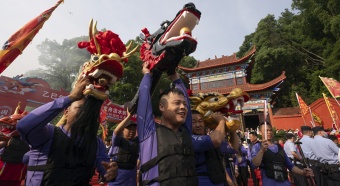
Staff members work at the NATO Headquarters in Brussels, Belgium, March 24, 2022. [Photo/Xinhua]
When NATO leaders met last week in Madrid, they were joined-for the first time-by leaders from Japan, South Korea, Australia and New Zealand. The invitations extended to the Asia-Pacific countries show that the trans-Atlantic alliance's ambitions far exceed the boundaries of its traditional geographical scope.
Although the participation of the four countries did help put on a show of unity for the alliance, especially after they agreed to cooperate with NATO to condemn Russia while hyping up the so-called China threat, their resolve remains to be tested by growing economic pressures at home.
On Monday, the chief of Japan's Mitsui OSK Lines, one of world's largest shipping companies, said Japan will have to continue importing Russian liquefied natural gas regardless of Russia's national policy.
Takeshi Hashimoto, president and chief executive of the shipping giant, said: "Nowadays, the spot market for both LNG and coal is quite expensive. That is one of the reasons why Japan is so reluctant to stop LNG imports from Russia."
Hashimoto's comments reveal how influential figures in Japan, which followed the United States' lead in imposing sanctions on Russia, are having second thoughts about that approach. They also suggest that, beyond the hugs and handshakes, the leaders at the gathering in the Spanish capital may start diverging from the common line on banning Russia's energy imports.
Since the Ukraine crisis started, Japan has not hesitated in taking provocative actions against Russia. However, as Japan's power system comes under pressure from a scorching heat wave, Tokyo has avoided any direct action on Russian LNG, which makes up 9 percent of Japan's imports.
Growing tensions
"The US and NATO members keep bragging that they are so-called like-minded countries but the talks could not disguise the growing tensions between them as the economic burden becomes more apparent and more pressing," said Wang Qi, a researcher of East Asian studies at the Chinese Academy of Social Sciences in Beijing. "In this context, people in Asia should stay on high alert over NATO because historically the alliance has constantly sought to make advances into new areas and domains and waged wars in various countries in the world to divert problems at home."
At the Madrid summit, NATO formally defined China for the first time as a challenge in its so-called Strategic Concept for the next decade, prompting grave concerns and expressions of firm opposition from Beijing.
"It is NATO that poses systemic challenges to world security and stability," said Zhao Lijian, a spokesman for the Chinese Foreign Ministry, in a recent news conference. Attempts to undermine Asia's peace and stability are "bound to fail", he added.
Mustafa Hyder Sayed, executive director of the Pakistan-China Institute, a think tank in Islamabad, said NATO's tilt toward Asia is built on shaky foundations.
In this approach, Washington and its allies have decided to jump on the new Cold War bandwagon, Sayed said. "Unfortunately, this will make the region more insecure and more susceptible to conflict," he said.
Yang Hanand Xu Weiweiin Hong Kong contributed to this story.









